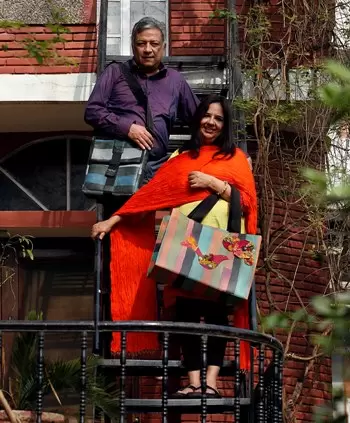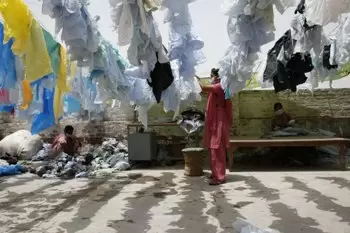Bringing about a change in the poor’s life by protecting the environment

21-June-2013
Vol 4 | Issue 25
Though everyone knows that plastics are not good for the environment, yet they are ubiquitous. Until the time you and I learn to say ‘No’ to plastics, the situation may not change much. The tons of plastic waste generated daily in our cities are a major environmental hazard.
But thankfully some are trying to address the problem in their own small ways.
 |
|
Anita and Shalabh Ahuja don't just transform plastic waste into stylish bags, they change the lives of rag pickers too
|
A Delhi based couple Anita and Shalabh Ahuja are doing a fabulous job, teaming up with rag pickers who supply plastic waste to them, which are made into stylish bags, footwear and other accessories and sold at boutiques in Europe.
In the course of transforming the plastic waste into beautiful products through their NGO ‘Conserve India’, the lives of the rag pickers who actually scavenge for plastics from garbage dumps also change for the better.
The profitable 100 percent export venture could have become a good commercial enterprise. But the couple stuck to their guns to let it remain a non-profit so that the earnings from the business could be used to uplift those living at the bottom of the pyramid.
The couple has made good impact. “I was a rag picker and living a hand to mouth existence but with the training I got from Conserve India today I earn Rs 16000 per month,” says Shamim, a resident of Laxminagar slum in Delhi who has been with Conserve India for past 12 years.
He had been picking waste near Anita’s house, but now he is the cutting master at their factory located at Bahadurgarh in west Delhi.
Conserve India has changed the lives of many like Shamim.
 |
|
About 600 rag pickers are working with Conserve India
|
But Conserve India had a humble beginning. Anita, who is the Creative Director of Conserve India, used to be unhappy about the rubbish heap in the capital and the failure of the corporation to effectively clear the garbage.
She was also disturbed by the tendency of the people in the neighbourhood to always accuse the rag pickers whenever a theft occurred in the vicinity.
She felt the rag pickers considered to be the dregs of society were actually doing a yeoman service to the environment by collecting the waste and carrying them to recycling plants.
In 2000 when the Delhi government introduced a program encouraging citizens to address the civic problems of the city in coordination with local authorities, Anita, who is an artist and writer, and Shalabh, an engineer, grabbed the opportunity to work with the rag pickers in the field of waste management.
Starting with creating compost from waste, they later shifted their focus to plastic waste.
Initially they planned to wash, dry and press the plastics into thick sheets and sell them as cheap night shelters.
However the finished sheets gave the look of leather and a designer friend used it to make a few handbags that became a hit with buyers.
 |
The couple took to the business and it grew into 100 percent export venture. In foreign stores their products are marketed on the strength of the environmental and social causes they support.
Profit from the business was ploughed back into training the rag pickers and many were absorbed into Conserve India as permanent employee.
“We feel the rag pickers should be organized so they could fight for their rights,” said Anita.
Conserve India is into advocacy to recognize the over 1.5 lakh rag pickers in Delhi and give legitimacy to their work.
“Bringing some stability and structure to the profession is also an important step towards supporting ragpickers, and educating them, for example, about market rates for the waste they collect and training them to handle the waste properly, so that they can work safely and for a fair price,” says Anita.
Conserve India pays above the prevailing market rate to these rag pickers for the waste they supply, and cares for their wellbeing.
 |
There are about 600 rag pickers working with Conserve India. They pay about Rs 5200 per month to rag pickers working with them. Those who bring sorted plastics are paid Rs 18-Rs 25 per kilogram, which is more than the Rs 12 per kg market rate.
Conserve India has tied up with a local hospital, which sends doctors to visit slums where the rag pickers reside to address their health needs.
They also run a primary school for kids of rag pickers, where about 70 children are now studying.
Though Conserve India is market driven and looks after the interests of hundreds of rag pickers, Anita says this is just not enough and much more needs to be done to uplift this community.
















